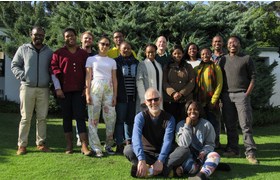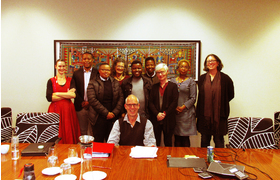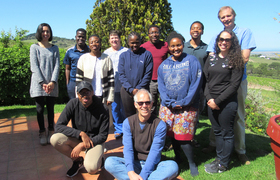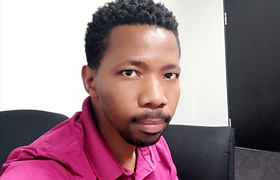nGAP: Growth, profile and consolidation
22 October 2019 | Story Robert Morrell. Photo Ricardo Adams. Read time 4 min.
One of the main goals of the Department of Higher Education’s (DHET) New Generation of Academics Programme (nGAP) is the successful completion of a doctoral degree. The writing retreats provide a chance for sustained writing, and many take advantage of this, waking up early and burning the midnight oil. But there is also time for chatting and socialising. This is central to the nGAP mission of developing a new generation of academics, one that is inserted into new intellectual networks and brings new energy and enthusiasm to the academic enterprise.
UCT is growing its early career cohort and nGAP is proving to be a great contributor to the process. Earlier this year UCT was successful in bidding for five new nGAP posts. These were awarded to Film and Television Studies (Humanities), Mechanical Engineering (Engineering & the Built Environment), Numeracy Centre (Centre for Higher Education Development), Organisational Psychology (Commerce) and Psychiatric Genetics (Health Sciences).
At the time of writing, two of these posts have been filled (see the biographies of Nastassja Koen and Muzi Sikhonde) and the others are in the process of being filled. The nGAP cohort has also been expanded by the inclusion of Andiswa Mfengu. Andiswa is an Associate currently working towards her PhD in the Department of Knowledge and Information Stewardship (Humanities).
In September the DHET put out a call for a Sixth Phase of nGAP, inviting universities to apply for further posts. Thus far, UCT has been awarded a total of 22 posts: 5 posts (Phase 1), 4 posts (Phase 2), 3 posts (Phase 3), 5 posts (Phase 4) and 5 posts (Phase 5).
A major feature of nGAP work has been to promote a collective identity, to create new networks and to foster a collaborative, friendly and productive environment. Writing retreats have been integral to this approach. In October members of the Cohort gathered for another quarterly writing retreat at the Zevenwacht wine estate.
nGAP members continue to make progress, attracting awards, developing national reputations and travelling internationally. Dr Philile Mbatha was awarded the prestigious University of Michigan African Presidential Programme Scholars Programme (UMAPS). Xolisa Guzula presented Halala Winner, a book she co-authored, at the South African Book Fair at Constitution Hill in September. Amanda Mtya attended the Computing in Construction Summer School in Senigallia, Italy in July. Kentse Mpolokeng presented at both the 47th Annual conference of the Anatomical Society of Southern Africa in Pilanesburg and in London at the International Federation of Associations of Anatomists (IFAA).
Three nGAP members were awarded NRF Research Developments Grants. Congratulations to Dr Melissa Abrahams, Frissiano Honwana and Ayanda Pekane. Dr Robert Morrell, nGAP manager, was appointed as a member of the Ministerial Task Team on Gender-based Violence and Sexual Harassment.
 This work is licensed under a Creative Commons Attribution-NoDerivatives 4.0 International License.
This work is licensed under a Creative Commons Attribution-NoDerivatives 4.0 International License.
Please view the republishing articles page for more information.
New Generation of Academics Programme (nGAP)
UCT has responded energetically to the New Generation of Academics Programme (nGAP), an opportunity provided by the Department of Higher Education (DHET) to build a new generation of black South African academics. The DHET’s 2015 vision document, “Staffing South Africa’s Universities Framework: A comprehensive, transformative approach to developing future generations of academics and building staff capacity”, proposes a suite of initiatives to address the challenge, with nGAP being the major instrument to increase the numbers of black South African academics.
The programme “involves the recruitment of highly capable scholars as new academics, against carefully designed and balanced equity considerations and in light of the disciplinary areas of greatest need”. The nGAP scholars are appointed into permanent positions where from the outset their conditions are customised to ensure their successful induction into the ranks of established academics.
The DHET provides funding over a six-year period to support the appointment of an nGAP lecturer, and their time is protected to provide the best possible opportunity for the completion of a doctorate degree in the shortest possible time. Once the degree is completed, the nGAP lecturer’s teaching commitments are steadily increased until they shoulder a full teaching load.
Since the first advertisement for nGAP posts in 2015, UCT has been awarded 17 nGAP positions: 5 (Phase 1), 4 (Phase 2), 3 (Phase 3) and 5 (Phase 4). These are distributed across all faculties.
UCT’s nGAP scholars operate as a single cohort, managed and coordinated by Dr Robert Morrell. Lecturers meet for quarterly meetings, writing retreats and various capacity-building activities all designed to support the completion of postgraduate qualifications (particularly doctorates) and to develop records of achievement that will testify to their emergence as self-standing, excellent academics. Each lecturer is mentored by a senior scholar, who provides support and guidance on the challenges that routinely face academics.
The nGAP manager sets great store in building the cohesion of the cohort and encouraging the establishment of new UCT networks while producing a collaborative, mutually supportive and embracing work culture.
According to Dr Morrell, “This group of academics will lead UCT in 15 to 20 years’ time ... Their vision of excellence, of being African and South African, of serving a wider community and producing knowledge for the planet, the continent and the country, will power UCT in years to come.”
Newsletters
In the news









































